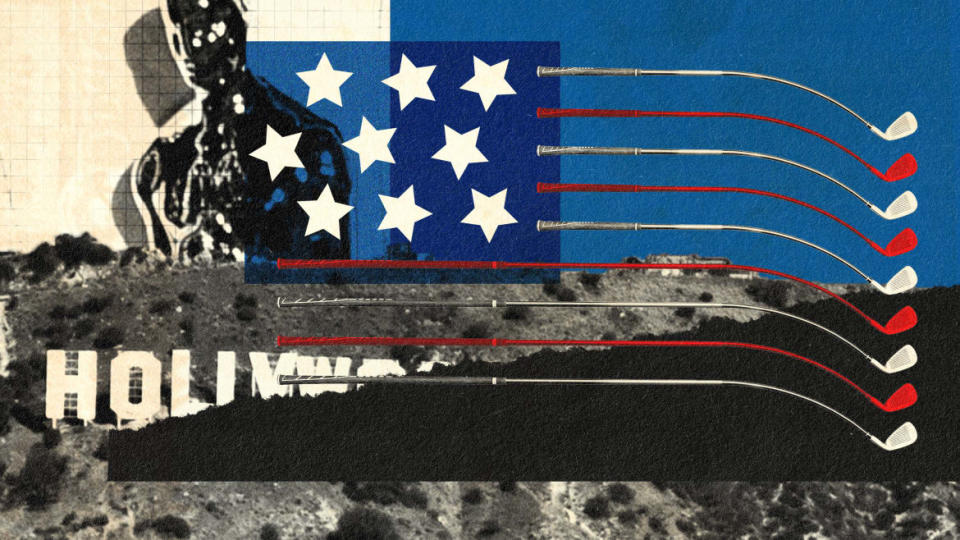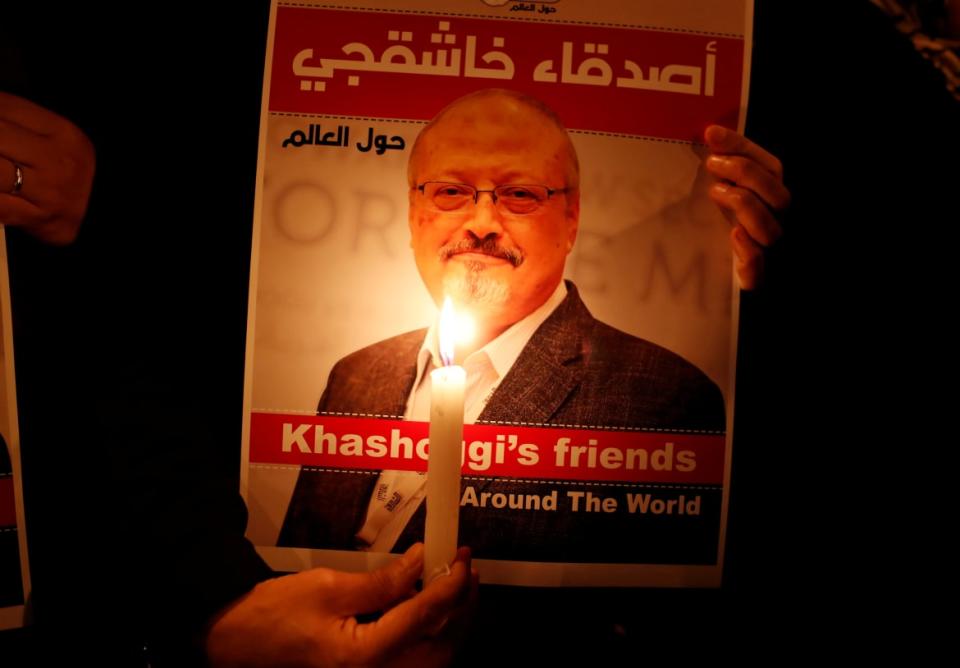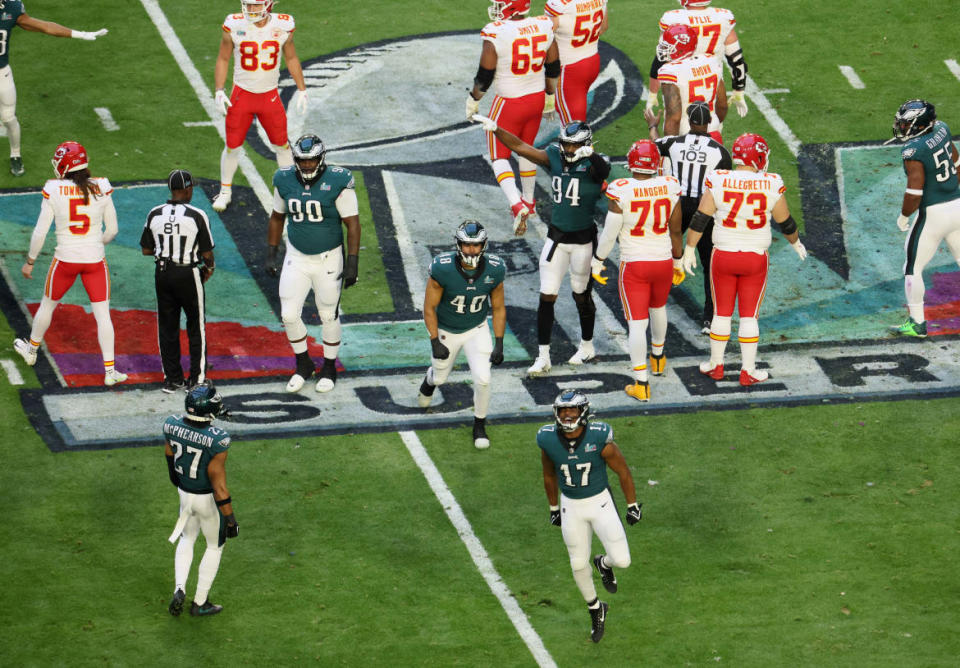Saudi Golf Takeover Shows U.S. Is Losing Its Cultural Superpowers

Is the United States’ status as the world’s cultural superpower at risk?
For decades, since the rise of Hollywood corresponded with America’s ascent on the world stage, the U.S. has ridden new waves of creativity and technological innovation to ever greater influence linked to our cultural output. This has led even our enemies to aspire to be more like us, to embrace our values and ideals, to see us as a unique source of imagination and ideas for the entire planet.
They listened to our music, our jazz and rock ’n’ roll. They dressed like the stars they saw in movies or television shows. They gathered by the hundreds of millions around radios and television sets to watch Muhammad Ali or the Academy Awards.
Golf Deal Leaves 9/11 Son Embarrassed to Fly American Flag
But as we watch as one of our major sports enterprises may soon be snapped up by a foreign power, as young people from the U.S. and around the world connect and view the planet on a Chinese-created platform like TikTok, as increasingly the television content streamed into homes worldwide (including in the U.S.) is not from Hollywood but from producers in Asia, Europe, and Latin America, we have to ask: Are we watching the era of U.S. cultural domination come to an end? And if we are, what does that mean for the U.S.?
Culture is often downplayed, not afforded serious attention in U.S. foreign policy circles. A brilliant international relations scholar, Harvard’s Joe Nye, more than three decades ago coined a term that has since been used to refer to those forms of national influence that did not involve force and coercion. He called it “soft power.” And while the concept—which also pertains to economic and other forms of nation-to-nation leverage—was worthy of study as he suggested, calling anything “soft” does not engender great respect in the macho wannabe world of the Blob.
But it is a big mistake to categorize cultural influence as a lesser form of power. This is crystal clear because it is not a mistake other nations make. Since time immemorial, one of the very first objectives of warring powers was to denigrate the culture of their enemies and to rally around their own shared beliefs, values, traditions and experiences. A primary goal in warfare has been to destroy cultural icons, national symbols, works of art or buildings or flags or heritage sites that fueled the sense of identity and perhaps even the patriotic drive of a targeted nation.
There are plenty of examples in the world today. Putin has suggested Ukraine is not actually a nation, does not have its own history. He has sought to redefine conquered people as Russian. He has denigrated Ukrainian language, destroyed landmarks. Just as he kidnaps Ukrainian children to deny the country its future, he tears apart its cultural fabric to deny it its past, to erase fathers, mothers and other ancestors. The Taliban did this to non-Islamic icons in Afghanistan when they took power. ISIS did the same. They sought to impose their culture.
Hitler did it to the Jews. European missionaries did it in colony after colony. We do it in our history books that tell only the stories of conquerors and that infantilize or minimize the conquered. Even today, in our own national culture wars, there are movements to ban books, ban “dangerous” stories, erase history, denigrate cultural diversity, the wrong clothes, the wrong religious beliefs.

Climate activists dressed as characters inspired by the Netflix series Squid Game ask Samsung to go 100% renewable energy outside the venue for the UN Climate Change Conference (COP26) in Glasgow, Scotland, Nov. 10, 2021.
Other countries realize the power of culture and have made cultural diplomacy a centerpiece of their international policies. China has done it with its Belt and Road initiative that has a big cultural element. But so too has South Korea, which has had a national strategy to promote K-pop and Korean films or television shows from Parasite to Squid Game.
A tactic many have found useful in this regard is what we sometimes call sports-washing. As with other cultural initiatives, the goal is to reach people not via political arguments or through their governments, but viscerally, in terms of what they feel. Sports, like creative arts, is powerful way to touch a foreign audience and forge a connection with them. For decades countries have tried to do this by hosting the Olympics. Again, the Nazis did it. The Soviets did it. China did it. Qatar did it by hosting the last World Cup as Russia did it before them. Other Gulf states have done it by buying soccer teams or recruiting soccer players with big contracts, by hosting Formula 1 grand prix or tennis tournaments.
There is no question that Saudi Arabia with the merger of its upstart LIV golf tour and the venerable US-based Professional Golfers Association (PGA) is attempting to make a direct connection with millions of influential Americans, Europeans and Asians via what is for many of them a passion, an element of their life that is a source of joy and meaning. In so doing, they hope to reshape the image of their country, try to get people to forget 9/11, or the murder of Jamal Khashoggi, or its appalling human rights record. (Note: The merger still has to be ratified by the PGA board.)

A demonstrator holds a poster with a picture of Saudi journalist Jamal Khashoggi outside the Saudi Arabia consulate in Istanbul, Turkey, Oct. 25, 2018.
While the first reactions to the merger include some outrage, the Saudis fully expect that to fade. They expect it because it usually does. Fans get caught up in the competition and react with their feelings about sport which is often distanced in their minds from politics. We know this from experience.
For other nations, like South Korea or, for example, Mexico, which in recent years has dominated the best director category at the Oscars, cultural validation is a path to not just to influence but to validation, to building national pride—which is in the interests of ruling politicians and their benefactors. It raises awareness which leads to tourism and trade. It builds ties which strengthen alliances and therefore even has a national security consequence.
In the past America has realized this and responded with cultural diplomacy initiatives. Most were of limited scale but still noteworthy like the jazz diplomacy of the Cold War era or ping pong diplomacy with the Chinese at the time our two societies were opening up to each other.
But for the most part, we have not invested heavily in government programs in this area because Hollywood, Madison Avenue, Motown, Nashville, our universities, our symphonies, our publishers, the NBA and more recently Silicon Valley were doing the heavy lifting. Indeed, we continue to score wins in this area. Millions more foreign eyes will be drawn to the U.S. with Lionel Messi joining the Inter Miami major league soccer team. But we must ask, is our influence fading in important ways?
But other nations have, as noted above, seized the initiative. The effective LIV take over of the PGA is just one example that has come at the expense of US influence. TikTok is another. It is in 150 countries. It has over 1 billion users a month. It is the world’s most popular app. The average user spends more than 1.5 hours a day on TikTok. And that is to say nothing of the benefit that accrues to TikTok from its access to data about users.
Squid Game is the number one streamed show in Netflix history with over 1.65 million downloads. Also on the Netflix top ten list of all time are two seasons of the excellent Spanish series Money Heist. What are the top viewed YouTube videos of all time? Number one is “Baby Shark Dance” from South Korea, with 12.85 billion views. Number two is from the U.S. but is a worldwide hit in Spanish “Despacito.” South Korea’s “Gangnam Style” is number 11 with nearly five billion views. The list includes more Asian and South Asian kids’ songs too.

Super Bowl LVII: Kansas City Chiefs v Philadelphia Eagles, State Farm Stadium, Glendale, Arizona, United States, Feb 12, 2023.
On the list of the top sports attractions in the world, you have to go down to number 9 to get to the Super Bowl which at 112 million viewers has just a tiny fraction of the clout of the real big draws like the Tour de France with 3.5 billion, the men’s soccer World Cup with 3.3 billion, the Cricket World Cup with 2.6 billion, the Summer Olympics with 2 billion, the Winter Olympics with the same, the Women’s World Cup with 1.12 billion (ten times more than the Super Bowl) and so on.
Future technological innovation will give more and more content creators worldwide access to global audiences. The United States clearly no longer has the inside track as it did when its movie, music and TV distribution infrastructure was so dominant. Further, with other countries actively competing to gain a share of global hearts and minds—whether for purposes of sportswashing or for ideological reasons or simply for commercial reasons—cultural battlefields will become more competitive.
The U.S. can shrug, if it likes, and be complacent, hoping that there will always be audiences for Seinfeld reruns. But with other states, including our primary rivals, the Chinese, dedicated enemies like Russia, Iran and other extremists finding new ways to use technology to advance their goals and to filter out cultural message they view as dangerous, the reality is that the U.S. will need to come to recognize just how much of our decades of global leadership has had to do with cultural factors rather than the size or budget of our military. We will also have to stop fighting our own internal culture wars if we are to have any chance continuing to lead on the global stage.
I have to be honest, steeped as I have been in the world of national security and foreign policy these past 30 years, I had to have my eyes opened to this reality. Fortunately for me, my wonderful wife, Carla Dirlikov Canales, who has had a career as an internationally acclaimed opera singer while also serving as a U.S. State Department cultural envoy for the past nearly 20 years, has become one of the world’s leading experts in cultural diplomacy.
She has run programs on the role culture plays in international affairs and as a force to drive social change at Harvard, the Fletcher School and at other leading universities. She is also currently serving in the Biden Administration at the National Endowment for the Arts working on issues of cultural exchange.
Carla has been an excellent teacher in these matters and her message has consistently been we can and must do more. As she has written, we are at a disadvantage as the only major nation without a ministry of culture. A correction there is long overdue. Recent events and trends have only further confirmed that she is right. If we are to maintain our leadership in the world, we must, as she has been regularly arguing to me and to her students and colleagues “learn to reach not just governments, but people worldwide, not just via diplomats talking points or politician’s speeches but through the work of artists, athletes and others who know how to touch people more deeply, in their hearts.”
Other nations understand this. We have long taken our powers in this regard for granted. The question now is whether we will step up to the challenge of cultivating this vital area of strength as we do the others we regard as essential to our leadership and security.
Get the Daily Beast's biggest scoops and scandals delivered right to your inbox. Sign up now.
Stay informed and gain unlimited access to the Daily Beast's unmatched reporting. Subscribe now.

 Yahoo Sports
Yahoo Sports 